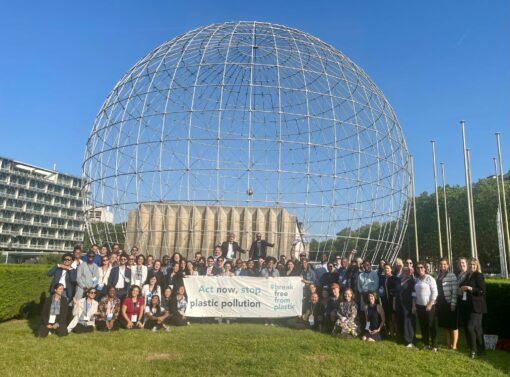
Global Plastics Treaty and INC-2 – a mixed (plastic) bag
Last week’s top acronym trending on my social media? INC-2. Feeling awkward that you do not know what that stands for? Don’t. The results of my backroom survey: half of the people attending the INC-2 meeting had a hard time saying what this acronym stands for. Still though, the many of us gathered in Paris last week knew exactly how high and what the stakes were: to lay down the basis for a global agreement to end plastic pollution.
Indeed, the second session of negotiations for Member States of the United Nations to discuss such an agreement or ‘Plastics Treaty’ took place last week at the UNESCO headquarters in Paris. The first round – INC1 – took place in Punta del Este, Uruguay, and you can find more about the latter in our previous blog written by our Director-Founder Joan Marc Simon.
But let’s focus on last week’s debrief.
Let-downs
The first disappointment hit us even before the Plastic Treaty talks start: the UN secretariat announced it would drastically limit the access of non-governmental participants to the UNESCO building hosting the INC-2 in Paris. As a result, our delegation was down to 2 persons. This decision impacted our colleagues from GAIA – Global Alliance for Incinerator Alternatives) and BFFP – Break Free From Plastic – even more as they are travelling from all around the world. A solidarity action outside the UNESCO building eventually enabled most of our colleagues to access the negotiations, but what a shame that time and energy had to be spent on this.
Disappointment number 2: our demand seems to be poorly addressed.
Going into Paris, Zero Waste Europe’s main ambitions for the negotiations were quite clear:
- Align the Global Plastics Treaty with the climate agreement i.e. plastic production should be capped at a level compatible with 1.5C degree warming;
- Focus on the whole life cycle of plastics from production to disposal, including social and health impacts;
- Acknowledge prevention and reuse of plastics as key levers to achieve 1&2
To start with, it was complicated to even get to the discussion of these elements. Member States not only reopened an item from the last meeting, called the Rules of Procedure (a.k.a how do we vote), but also spent two (looong) days on it. To us it is clear: certain countries with vested interests in the oil and petrochemical industry are using this question as a strategy to delay the discussion on content, hence trying to lower the overall ambition of the Treaty.
So 2 days later (…), when discussions eventually start on the content, we are saddened to see how utopic our first demand actually is. Although some countries/blocs, such as the European Union, Rwanda, Ecuador, and Mexico explicitly called for the need for global reductions targets on plastic pollution, a strong ambition – to cap plastic production in such a way that the carbon we can emit stay under 1.5C warming – couldn’t be felt in the room last week.
On our second and third demand: here again, though some Member States and the European Union referred to the waste hierarchy and supported e.g. reuse of plastics, a lot of the discussions went spent in downstream impacts of waste, with Member States focussing on (chemical) recycling, EPR, i.e. managing plastic pollution after disposal.
My (pragmatic?) colleague even thinks we are heading to a ‘waste management Treaty’, which we all agree would be a failure as the goal is to stop plastic production.
But to be balanced, I’ll also have to mention a positive outcome.
On the bright side…
Even if nearly half of the INC2 session was lost in endless debates around the Rules of Procedure, countries did make progress in the form of a mandate for the INC Chair to write a zero draft text of the treaty ahead of INC-3. This official draft text will form the basis for INC-3 and hopefully enable meaningful discussion on the content.
So, what’s next?
The next INC venues will be in Nairobi, Kenya, in November this year (INC-3); in Ottawa, Canada, in April 2024 (INC-4); and finally in the Republic of Korea at the end of 2024 (INC-5).
All in all, even if our hopes and expectations for a Plastics Treaty are still really high, it is clear that an ambitious treaty is not a given, quite the contrary. Civil society organisations will not lower their guard until the end of the process. We will keep you posted.
What about that INC-2 acronym?
Oh, and yes, INC-2 stands for the second meeting (2) of the Intergovernmental Negotiating Committee (INC) for a global agreement to end plastic pollution.